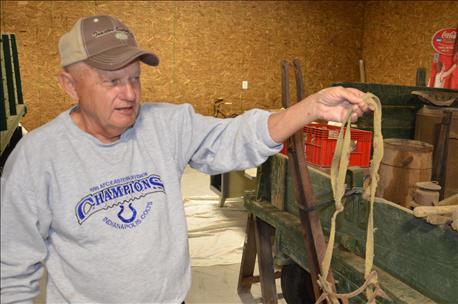
The old wagon sat in the back barn on Jim Hensley’s place for decades. Recently, Hensley, Franklin, and his grandson, Jarett, pulled out the wagon, unloaded the relics stored there and cleaned it up. Hensley figures the wagon deserves a spot in his new storage barn.
“I remember using it when I was younger,” he says. “An old guy with a seed-cleaning truck cleaned our seed wheat, and we stored it in the wagon.”

TIMES WORTH REMEMBERING: Jim Hensley piles relics from an old wagon into a newer wagon. When the relics were used by Hoosier farmers decades ago, there was a strong sense of ethics in rural areas.
The kids I coach in various FFA activities think I grew up with dinosaurs for pets. Maybe I did. When Hensley couldn’t come up with the name of the old gentleman who drove the truck, I did. I remember him, too. My father, Robert, hired the same old guy, Robert Townsend, to clean seed wheat.
It occurred to me that the wooden-wheeled wagon could tell quite a few stories if it could talk. That old wagon has seen decades of change. Jarett pulled out a wooden tongue that someone made to convert it from horse-drawn to tractor-drawn.
Core values
The "good old days" weren’t always good. There were hard times, hard work and diseases without remedy. But somehow, through 200 years of Indiana history, early settlers and farmers developed a set of values that helped the fledgling state prosper.
Perhaps we would do well to lift up those core values today. Here are four such values.
1. Early Hoosiers were willing to work hard. I didn’t chop down trees to build a cabin or fence like early Hoosiers did, but I threw silage out of a silo by hand and scooped it into feed bunks by hand. That’s manual labor. Modern conveniences are great, but have they dulled our senses as to the value of hard work? You don’t have to do manual labor to work hard, but you must understand the value of a work ethic.
2. Early Hoosiers helped one another. Jarett recalls a story about his maternal grandfather, Steve Miller, who drove his combine across two counties to help a friend dying of cancer harvest one final crop. Helping people in need without expecting anything in return is a Hoosier tradition.
3. Early Hoosiers made do with what they had. It appears the old wagon was repaired a few times. When something wore out, early Hoosiers figured out how to make it last longer. Purdue University Extension Director Jason Henderson says one of the questions bankers may ask this year is how much of the farm income you intend to invest in family living expenses or items for the family. There’s nothing wrong with enjoying new things, as long as you can afford them.
4. Early Hoosiers valued honesty and integrity. Perhaps these are the qualities Hoosiers need to rediscover most heading into the next 200 years. I collect farm toys, and I typically buy a couple from H&M Farm Toys, Montgomery, at the state fair. I once asked if they accepted credit cards. “No, a check or a firm handshake will do,” was the reply. Early Hoosiers did business on handshakes. Unfortunately, it’s not always wise to do that today. But there’s no reason we can’t return to those days of honesty and integrity that produced trust and respect for one another.
About the Author(s)
You May Also Like




